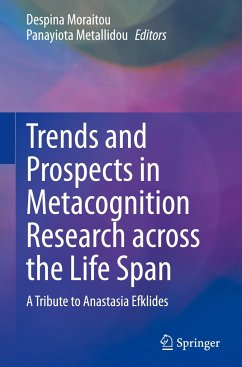Trends and Prospects in Metacognition Research across the Life Span
A Tribute to Anastasia Efklides
Herausgegeben:Moraitou, Despina; Metallidou, Panayiota
Trends and Prospects in Metacognition Research across the Life Span
A Tribute to Anastasia Efklides
Herausgegeben:Moraitou, Despina; Metallidou, Panayiota
- Gebundenes Buch
- Merkliste
- Auf die Merkliste
- Bewerten Bewerten
- Teilen
- Produkt teilen
- Produkterinnerung
- Produkterinnerung
This volume brings together trends and their prospects to understand the complexity of metacognitive phenomena, with emphasis on the interactions of metacognition with affect. It discusses the three perspectives in understanding these interactions: the possible mechanisms underlying them, the manifestation of interactions of metacognition with affect in self- and co-regulation in social and educational contexts, and changes during development in young children and older adults. This volume is a tribute to Professor Emerita Anastasia Efklides, who was among the pioneers to investigate and argue…mehr
Andere Kunden interessierten sich auch für
![Trends and Prospects in Metacognition Research across the Life Span Trends and Prospects in Metacognition Research across the Life Span]() Trends and Prospects in Metacognition Research across the Life Span149,79 €
Trends and Prospects in Metacognition Research across the Life Span149,79 €![The Psychology of Quality of Life The Psychology of Quality of Life]() M. Joseph SirgyThe Psychology of Quality of Life164,99 €
M. Joseph SirgyThe Psychology of Quality of Life164,99 €![A Primer on Multiple Intelligences A Primer on Multiple Intelligences]() Matthew N. O. SadikuA Primer on Multiple Intelligences104,99 €
Matthew N. O. SadikuA Primer on Multiple Intelligences104,99 €![Current Trends in Eye Tracking Research Current Trends in Eye Tracking Research]() Current Trends in Eye Tracking Research134,99 €
Current Trends in Eye Tracking Research134,99 €![The Psychology of Quality of Life The Psychology of Quality of Life]() M. Joseph SirgyThe Psychology of Quality of Life235,39 €
M. Joseph SirgyThe Psychology of Quality of Life235,39 €![A Primer on Multiple Intelligences A Primer on Multiple Intelligences]() Matthew N. O. SadikuA Primer on Multiple Intelligences104,99 €
Matthew N. O. SadikuA Primer on Multiple Intelligences104,99 €![Current Trends in Eye Tracking Research Current Trends in Eye Tracking Research]() Current Trends in Eye Tracking Research134,99 €
Current Trends in Eye Tracking Research134,99 €-
-
-
This volume brings together trends and their prospects to understand the complexity of metacognitive phenomena, with emphasis on the interactions of metacognition with affect. It discusses the three perspectives in understanding these interactions: the possible mechanisms underlying them, the manifestation of interactions of metacognition with affect in self- and co-regulation in social and educational contexts, and changes during development in young children and older adults. This volume is a tribute to Professor Emerita Anastasia Efklides, who was among the pioneers to investigate and argue the importance of the interactions between metacognition and affect. It serves as a dedication to her contribution in the widening of the scope of research in metacognition and self-regulated learning.
Produktdetails
- Produktdetails
- Verlag: Springer / Springer International Publishing / Springer, Berlin
- Artikelnr. des Verlages: 978-3-030-51672-7
- 1st edition 2021
- Seitenzahl: 320
- Erscheinungstermin: 25. Februar 2021
- Englisch
- Abmessung: 241mm x 160mm x 23mm
- Gewicht: 590g
- ISBN-13: 9783030516727
- ISBN-10: 3030516725
- Artikelnr.: 59493766
- Herstellerkennzeichnung Die Herstellerinformationen sind derzeit nicht verfügbar.
- Verlag: Springer / Springer International Publishing / Springer, Berlin
- Artikelnr. des Verlages: 978-3-030-51672-7
- 1st edition 2021
- Seitenzahl: 320
- Erscheinungstermin: 25. Februar 2021
- Englisch
- Abmessung: 241mm x 160mm x 23mm
- Gewicht: 590g
- ISBN-13: 9783030516727
- ISBN-10: 3030516725
- Artikelnr.: 59493766
- Herstellerkennzeichnung Die Herstellerinformationen sind derzeit nicht verfügbar.
Despina Moraitou is Assistant Professor in Cognitive Geropsychology in the School of Psychology, Aristotle University of Thessaloniki, Greece. She is author and co-author of 71 articles published in international and Greek journals and books as well as of more than 180 presentations, invited and others, in international and Greek conferences. She is Co-Editor (2015-) of the "Journal of Happiness Studies". She was editorial assistant (2006-2009) of the journal "Learning and Instruction". She was invited as Guest Associate Editor (2017) of the special issue - Supplement, 20(2), of the Hellenic Journal of Nuclear Medicine. She is Co-Editor (2013) of the volume "A positive psychology perspective on quality of life [Social Indicators Research Series, 51. Dordrecht: Springer]". Despina Moraitou is President (2018-2022) of the Division 7 - Applied Gerontology of the International Association of Applied Psychology (IAAP). Her research interests lie in the area of cognitive science of aging with emphasis on complex thought and the relationship between cognition and affect during lifespan development and aging. Her most recent work focuses on the examination of cognitive control, emotion decoding, and Theory of Mind in healthy and pathological aging. She is interested in early detection of dementia-related cognitive impairment as well as in examining retrogenetic models of cognitive development. Panayiota Metallidou is Professor in Cognitive Psychology in the School of Psychology, Aristotle University of Thessaloniki, Greece. She is author and co-author of 58 articles published in international and Greek journals and books as well as of more than 100 presentations, invited and others, in international and Greek conferences. She is in the Editorial Board of the journals "Metacognition and Learning" and "New Ideas in Psychology" and reviewer in other 8 international journals and 2 Greek journals. She was invited as Guest Associate Editor of the "Psychology: The Journal of the Hellenic Psychological Society" (2000, Vol. 7, Special Issue on the Motivational aspects of Self), of the "Scientific Annals of the Psychological Society of Northern Greece" (2005, Vol. 3-4, and 2010, Vo. 8) and of the "Scientific Annals of School of Psychology" (2009, Vol. 8). Panayiota Metallidou is President of the Psychological Society of Northern Greece (P.S.N.G.) (2014- ). Her research interests include: Metacognition and self-regulated learning, attention development and meta-attention, social cognition, and epistemological thinking in children and adolescents. Her most recent work focuses on comprehension monitoring, achievement emotions, coping strategies and affect regulation in educational settings.
Part I. Preface and Tribute to Anastasia Efklides.- Part II. The Mechanism Underlying the Relations between Metacognition and Affect.- 1. Why Do Emotional Stimuli Influence Memory Monitoring? Theory, Evidence and Future Directions (Whiterby).- 2. The Role of Fluency and Dysfluency in Metacognitive Experience (Schwartz).- 3. The Relationship of Effortful Control to Academic Achievement via Metacognition (Papantoniou).- 4. Metacognitive Awareness across the Creative Process (Antonietti).- Part III. Metacognition and Affect in Self- and Co-Regulation.- 5. Integrating Metacognition and Emotions during Self-Regulated Learning with Advanced Learning Technologies: Challenges and Opportunities (Azevedo).- 6. The Value of Emotional-Motivational Regulation Program on Strategic Processing, Negative Emotions and Motivation in Mathematical Problem Solving (Tzohar-Rosen).- 7. The Role of Social Emotions and Co-Regulation of Learning During Complex Mathematics Problem Solving (Singh).- 8. Metacognitive Regulation in Collaborative Science Education (Vauras).- 9. Elementary School Children's Self- and Peer Scoring of Test Responses Using Feedback (Van Loon).- Part IV. Metacognition and Affect on Life-Span Development.- 10. Influences on the Emergence and Development of Affective and Cognitive Regulation in Early Childhood (Whitebread).- 11. Cognitive and Affective Components of Theory of Mind in Childhood (Misailidi).- 12. The Role of Parents and Teachers in the Development of Children's Self-Regulated Learning Skills (Demitzaki).- 13. Strategic and Motivational Influences on Metacognition in Older Adulthood (McGillvray).- 14. Metacognition in Cognitive Rehabilitation in Adults: A Literature Review Bampa.
Part I. Preface and Tribute to Anastasia Efklides.- Part II. The Mechanism Underlying the Relations between Metacognition and Affect.- 1. Why Do Emotional Stimuli Influence Memory Monitoring? Theory, Evidence and Future Directions (Whiterby).- 2. The Role of Fluency and Dysfluency in Metacognitive Experience (Schwartz).- 3. The Relationship of Effortful Control to Academic Achievement via Metacognition (Papantoniou).- 4. Metacognitive Awareness across the Creative Process (Antonietti).- Part III. Metacognition and Affect in Self- and Co-Regulation.- 5. Integrating Metacognition and Emotions during Self-Regulated Learning with Advanced Learning Technologies: Challenges and Opportunities (Azevedo).- 6. The Value of Emotional-Motivational Regulation Program on Strategic Processing, Negative Emotions and Motivation in Mathematical Problem Solving (Tzohar-Rosen).- 7. The Role of Social Emotions and Co-Regulation of Learning During Complex Mathematics Problem Solving (Singh).- 8. Metacognitive Regulation in Collaborative Science Education (Vauras).- 9. Elementary School Children's Self- and Peer Scoring of Test Responses Using Feedback (Van Loon).- Part IV. Metacognition and Affect on Life-Span Development.- 10. Influences on the Emergence and Development of Affective and Cognitive Regulation in Early Childhood (Whitebread).- 11. Cognitive and Affective Components of Theory of Mind in Childhood (Misailidi).- 12. The Role of Parents and Teachers in the Development of Children's Self-Regulated Learning Skills (Demitzaki).- 13. Strategic and Motivational Influences on Metacognition in Older Adulthood (McGillvray).- 14. Metacognition in Cognitive Rehabilitation in Adults: A Literature Review Bampa.








